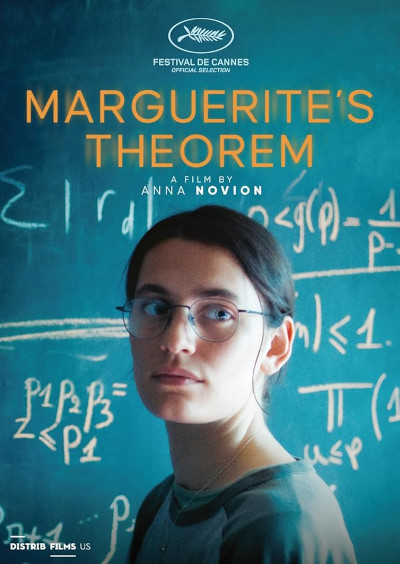Newsroom
Stay informed with our latest news and announcements on this page. For more in-depth content, we also encourage visitors to explore our bimonthly STRUCTURES Newsletter magazine, which features a variety of articles, interviews with members, and background information on our latest research and activities.
We are delighted to celebrate International Women's Day with a special screening of the French film "Marguerite's Theorem" on Saturday, 8 March 2025. The programme will feature a champagne reception, the film screening, and a post-screening discussion with invited guests. This event is jointly organized by the Collaborative Research Centre 1225 ISOQUANT and the STRUCTURES Cluster of Excellence.
About the Film:
Marguerite’s Theorem follows the story of brilliant mathematics student, Marguerite, who faces a setback when a mistake in her dissertation jeopardizes her future plans at France’s top university, École Normale Supérieure. Her doctoral advisor turns away from her to mentor a young man instead. Disheartened, Marguerite abandons her academic life and tries to build a new future outside the world of academia.
Event Details:
- Date: Saturday, 8 March 2025
- Venue: Kamera Kino Heidelberg. Brückenstraße 26, 69120 Heidelberg
- Schedule:
- 10:30 AM – Arrival and Champagne Reception
- 11:00 AM – Screening of Marguerite’s Theorem (French with English subtitles)
- 01:00 PM – Post-screening discussion with invited guests
Tickets & Registration:
Tickets are free of charge for all students and employees of the Faculty of Physics and Astronomy & Faculty of Mathematics and Computer Science. Places are limited, and allocation will be on a first-come, first-served basis.
Prior registration is required! Please register here.
Further information:
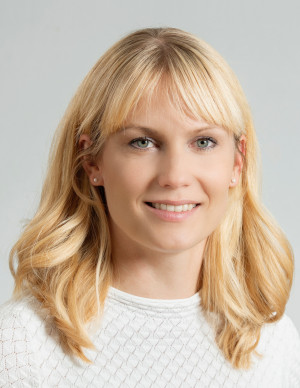
STRUCTURES member Dominika Wylezalek has been appointed as a new Professor for Extragalactic Astrophysics at the Center for Astronomy at Heidelberg University (ZAH) – one of the participating institutions in STRUCTURES – and Director at the Astronomisches Rechen-Institut (ARI), effective March 1, 2025. She will lead the research group “Galaxy Evolution and AGN (GALENA)” at ARI, focusing on the interplay between supermassive black holes and galaxy evolution.
Prof. Dr. Wylezalek's research employs multi-wavelength observations from leading ground- and space-based telescopes to investigate how supermassive black holes influence their host galaxies across different cosmic epochs. In her research, Prof. Wylezalek deals with the physical processes that influence the formation and evolution of galaxies. Using spectroscopic measurements, she studies how active galactic nuclei – that is, galactic cores (quasars) fed by supermassive black holes – impact on the development of their host galaxies and their galactic environment. She has already been able to show that the energy pumped into the environment from these black holes has a strong influence on the formation of stars and hence on the present form of galaxies. Using data from the James Webb Space Telescope (JWST) she discovered a galaxy cluster with a large number of massive galaxies emerging around an extremely red quasar. It stems from the cosmological epoch of very active star formation about ten billion years ago. Wylezalek’s observations help us to understand how galaxies in the early universe melted into the cosmic web we see today.
Dominika Wylezalek studied physics at Heidelberg University (Bachelor) and University of Cambridge (Master). In 2014 she earned her doctorate from the Ludwig Maximilian University of Munich (LMU) as a fellow of the International Max Planck Research School on Astrophysics (IMPRS) at the European Southern Observatory (ESO) in Garching near Munich. She went on to do postdoctoral research at Johns Hopkins University in Baltimore (USA) and at ESO Garching as a research fellow. Since 2020, Dr Wylezalek has led a DFG Emmy Noether junior research group at Heidelberg University. For her contributions to observational astrophysics, the scientist has been honoured with the 2023 MERAC Prize of the European Astronomical Society (EAS), the 2023 Ludwig Biermann Award of the German Astronomical Society (AG) and the 2024 Heinz Maier-Leibnitz Prize by the German Research Foundation (DFG).
Further information:
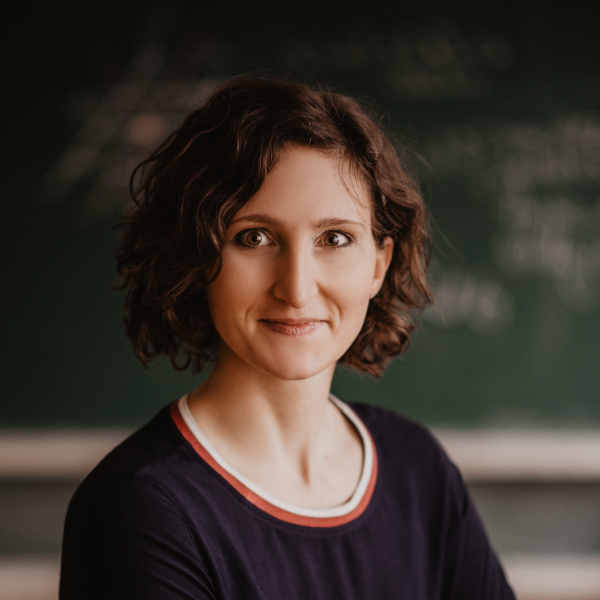
We are pleased to announce that Prof. Petra Schwer has been elected as a STRUCTURES Trust Professor by the Young Researchers Convent (YRC). Since 2024, Petra Schwer has been leading the research group Geometry and Group Theory at Institute for Mathematics (IMa). She joins the current team of Trust Professors consisting of Lavinia Heisenberg (Theoretical Physics), Matthias Bartelmann (Theoretical Physics), and Ullrich Köthe (Scientific Computing), who have been reelected.
Trust Professors play a crucial role in supporting early-career researchers by offering guidance, career advice, and mediation in case of conflicts within research groups or with supervisors. Their goal is to foster a supportive and constructive research environment. Every year, the YRC elects four Trust Professors. The YRC is a subgroup of the STRUCTURES Cluster of Excellence that connects and represents the early-career researchers of our scientific community, including students and postdocs.
We warmly congratulate Prof. Schwer on her election and thank all our Trust Professors for their commitment to supporting early-career researchers.
Further information:

On Thursday, April 3, 2025, various companies, organizations, and universities across Germany will open their doors for Girls'Day, a nationwide initiative aimed at inspiring girls to explore career paths in IT, craftsmanship, natural sciences, and technology – fields where women are still underrepresented.
Several STRUCTURES members and participating institutions are offering an engaging course programme for the Girls'Day. Below is an overview of the activities hosted at various participating and collaborating institutes:
- Physik hautnah! Mitmachprogramm der Fakultät für Physik & Astronomie (→ Details & Registration, German only)
- Physik-Detektivinnen: Entdecke die Geheimnisse der Welt um dich herum (Klasse 5-6)
- Elektronenmikroskopie - ein Blick in die Welt der Mikro- und Nanopartikel (Klasse 5-6)
- Die Geheimnisse des Lichts (Klasse 6-8)
- Die Welt der kleinsten Teilchen (Klasse 7-8)
- Zucker und Licht (Klasse 7-8)
- Mit Physik den Klimawandel verstehen (ab Klasse 8)
- Programmieren lernen mit Robotern (ab Klasse 8)
- Wie du selbst mit Galaxien die Ausdehnung des Universums messen kannst (ab Klasse 8)
- Neuromorphe Computer - Das Gehirn im Labor nachgebaut (ab Klasse 8)
- Kreativ mit ChatGPT & co. - Interaktiv die neusten KIs verstehen (ab Klasse 8)
- Spurensuche im Wasser. Was uns Isotope über die Umwelt verraten. (ab Klasse 9)
- Es werde Licht! - Ein Blick zum Anfang unseres Universums (ab Klasse 9)
- A dance of stars and black holes (in ENGLISH ONLY, 10th-13th grade)
- Die Musik der Sterne – Ein Tag als Astronomin am HITS: → Details & Registration (German only)
- Mathematik und Muster – Was Omas Tapete und der Gehweg gemeinsam haben (Ein spannender Tag als Mathematikerin an der Uni): → Details & Registration (German only)
The "Physik hautnah!" programme is supported by the SFB 1225 "Isoquant" and the Emmy Noether Research Group "Many-body QCD phenomena in high-energy proton and nuclear collisions" of the German Research Foundation. The Girls' Day events of the MINTmachen! school initiative are supported by the Rotary Club Heidelberg-Schloss in 2025.
Further information:
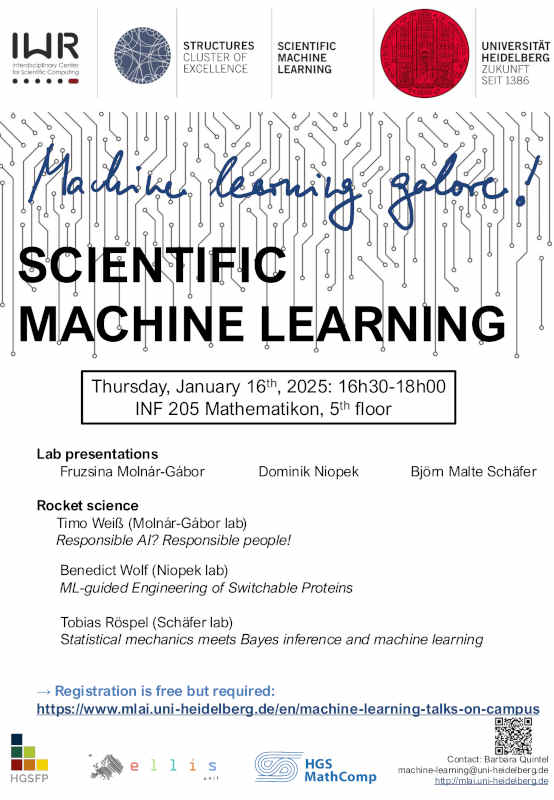
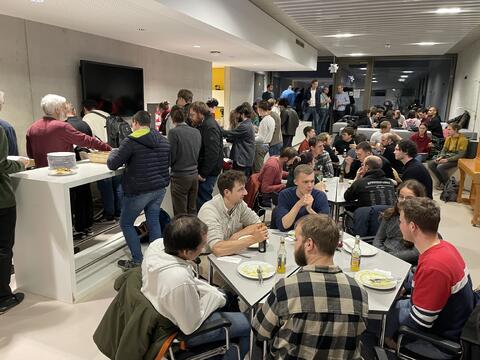
We are delighted to announce the next event in our Machine Learning Galore! series, focusing on Scientific Machine Learning, which will take place on Thursday, January 16, from 4:30 to 6:00 pm at INF 205 Mathematikon (5th floor). The event will feature lab presentations by principal investigators, followed by brief presentations from junior scientists showcasing their latest work. Extended discussions will offer ample opportunity for in-depth exchanges. In order to participate, please register for free at the ML-AI portal.
Event Details:
- Lab Presentations:
- Fruzsina Molnár-Gábor (Faculty of Law of Heidelberg University, and BioQuant Center Heidelberg)
- Dominik Niopek (Institute for Pharmacy and Molecular Biotechnology Heidelberg)
- Björn Malte Schäfer (Center for Astronomy, Heidelberg University)
- Science Talks:
- Timo Weiß (Molnár-Gábor Lab): Responsible AI? Responsible People!
- Benedict Wolf (Niopek Lab): ML-Guided Engineering of Switchable Proteins
- Tobias Röspel (Schäfer Lab): Statistical Mechanics Meets Bayesian Inference and Machine Learning
About Scientific Machine Learning
Scientific Machine Learning is a collaborative initiative by the Interdisciplinary Center for Scientific Computing (IWR) and the STRUCTURES Cluster of Excellence. Its mission is to foster interaction and exchange within the local machine learning community, and to support its development by consolidating activities and resources that might otherwise remain scattered across individual institutions or disciplines. The initiative aligns closely with the objectives of STRUCTURES, which aims to advance fundamental research, and with IWR’s focus on applying machine learning to address long-standing challenges in the natural and life sciences, engineering, and the humanities.
Further information:
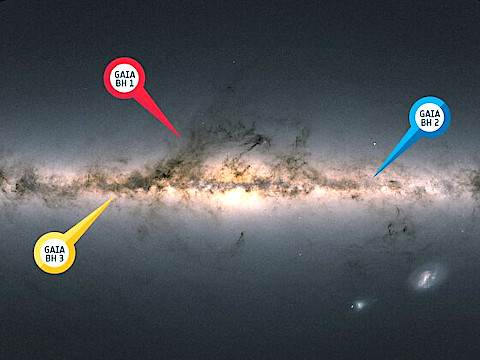
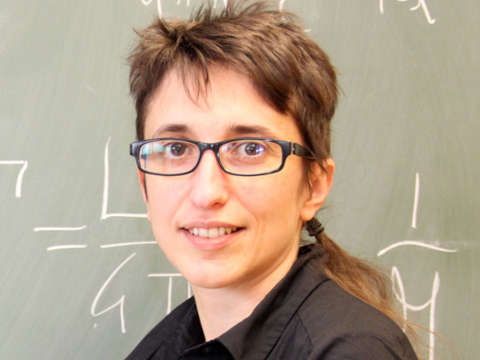
For her research project “The formation of dormant black hole binaries: a key to mass transfer and stellar dynamics (DoBlack),” the German Research Foundation (DFG) has granted STRUCTURES Professor Michela Mapelli, astrophysicist at the Center for Astronomy of Heidelberg University (ZAH), around half a million euros.
The DoBlack project will investigate the formation of so-called dormant black holes in binary star systems – pairs where one companion is a black hole that shows no signs of mass transfer, typically detectable through X-ray emissions. These “silent” black holes have attracted increasing interest in recent years. While black holes detected with gravitational wave interferometers often represent the tip of the iceberg of the population with extreme orbital properties, dormant binaries are thought to be more representative of the black hole population in the local Universe.
To date, only a handful of such systems have been observed. However, the forthcoming fourth data release of the Gaia astrometric satellite is expected to identify several hundreds to thousands of these dormant black holes. Already, Gaia data has led to the discovery of three such systems. The orbital period of the first two of them, Gaia BH1 and BH2 (186 and 1300 days, respectively) is a puzzle for astrophysical models: too tight to be explained with a non-interacting system and too large for a binary star that evolved via unstable mass transfer.
DoBlack will address these puzzles by employing advanced numerical simulations. “DoBlack is a natural and exciting extension in understanding the formation of the new class of BH binaries,” resumes Mapelli. The goal of DoBlack is to model the formation of dormant black holes with new binary evolution models, star cluster simulations, and a comprehensive exploration of the parameter space. “We aim to reconstruct the most likely formation pathways of dormant black holes and provide a key to explain the seemingly impossible orbital period of Gaia BH1 and BH2,” says Michela Mapelli.
Michela Mapelli has led the DEMOBLACK group at the Center for Astronomy of Heidelberg University (ZAH) since July 2023 and is a member of the STRUCTURES Excellence Cluster. Her main research focus is understanding the formation of astrophysical black holes.
Further information:
STRUCTURES Professor Michela Mapelli Becomes Humboldt Scouting Sponsor for Early-Career Researchers
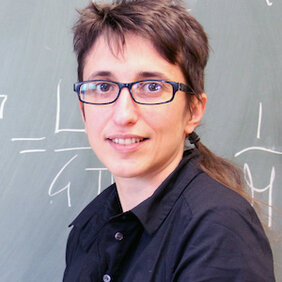
We are delighted to announce that Alexander von Humboldt Foundation has appointed STRUCTURES Professor Michela Mapelli, astrophysicist at the Center for Astronomy of Heidelberg University (ZAH), as a Henriette Herz Scout.
The Alexander von Humboldt Foundation's Henriette Herz Scouting Programme invites international researchers to conduct research projects in Germany. As a scout, STRUCTURES Professor Michela Mapelli now has the opportunity to identify three excellent researchers in the early stages of their careers and recommend them directly for a Humboldt Fellowship. Humboldt Scouts are selected based on their outstanding research achievements and excellence in mentoring.
Michela Mapelli has led the “Demography of Black Hole Binaries in the Era of Gravitational-Wave Astronomy” (DEMOBLACK) group at the Center for Astronomy of Heidelberg University (ZAH) since July 2023. Her main research focus is understanding the formation of astrophysical black holes.
“I am very excited to become a Humboldt Scout. My priority will be to bring to Heidelberg outstanding early-career scientists who show promise of becoming leaders in the fields of Computational Astrophysics and Gravitational-Wave Astronomy,” says Michela Mapelli. “I will focus on identifying excellent female young researchers as well as candidates from disadvantaged backgrounds and underrepresented minorities.”
The Henriette Herz Scouting Programme enables three international scientists to do research at the ZAH with a Humboldt Fellowship. Young talents as well as experienced researchers are eligible. The sponsorship period is 24 months for postdocs and 18 months for experienced researchers. Financed by the Federal Ministry of Education and Research (BMBF), the programme has opened up a new way of accessing the Humboldt Research Fellowship. The new, active scouting procedure enables successful academics in Germany to directly approach highly sought-after candidates from abroad who have so far not applied to the Foundation and invite them to conduct joint research at their institutions. In a competitive peer-review process, the Humboldt Foundation annually selects up to 40 scouts who will then themselves identify junior researchers abroad and recommend them to the Foundation. Both in terms of subject and region, the programme thus recruits new collaborative partners for Germany. It also seeks to increase the percentage of women sponsored under the Humboldt Research Fellowship Programme.
Further information:
